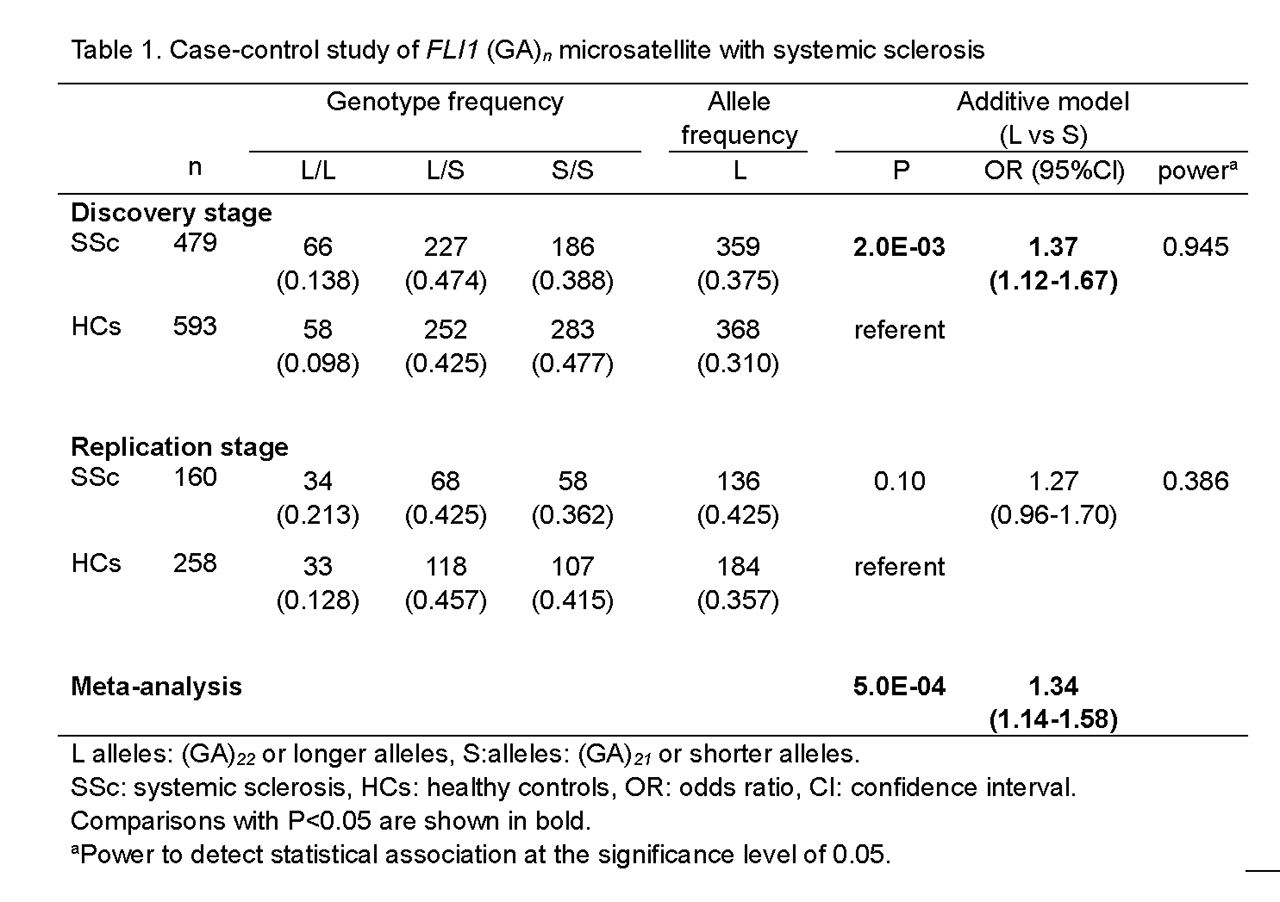Session Information
Session Type: Poster Session (Tuesday)
Session Time: 9:00AM-11:00AM
Background/Purpose: Susceptibility genes which can account for the characteristic features of systemic sclerosis (SSc) such as fibrosis, vasculopathy and autoimmunity remain to be determined. A series of extensive studies by Asano and colleagues using genetically engineered mice convincingly demonstrated that deficiency of a transcription factor Fli1 can play a causal role in the development of SSc with all these characteristic features. Although previous genome-wide association studies (GWAS) have not reported association of single nucleotide polymorphisms (SNVs) in the FLI1 gene, FLI1 contains (GA)n microsatellite in its regulatory region, which has been shown to be associated with expression level of FLI1. Because microsatellite polymorphisms are not usually captured by GWAS unless they are in tight linkage disequilibrium with SNVs, we thought it is possible that FLI1 microsatellite may partly account for the “missing heritability” of SSc. In this study, we directly genotyped FLI1 (GA)n microsatellite and examined whether it is associated with susceptibility to SSc.
Methods: Genomic DNA from 639 Japanese SSc patients and 851 healthy controls (HCs) was genotyped for (GA)n microsatellite using the fragment assay. In the discovery stage, the genotype distribution was compared between 479 patients and 573 HCs, and the cut-off repeat number for the susceptibility to SSc was determined by receiver operating characteristic (ROC) analysis to classify the alleles into L (long) and S (short) alleles. In the replication stage, 160 patients and 268 HCs were examined, and the data from both stages were combined using meta-analysis. Association with susceptibility and clinical characteristics was examined using logistic regression analysis with the adjustment for sex. FLI1 mRNA levels were determined using quantitative RT-PCR.
Results: In the discovery stage, genotype distribution of the (GA)n microsatellite alleles in SSc patients showed a trend towards extension as compared with that in the HCs (Cochran-Armitage test for trend, P=0.045)(Figure 1). Based on the ROC analysis, (GA)n alleles with ≥22 repeats were collectively defined as L alleles, and alleles with ≤21 repeats as S alleles. The same trend was observed in the discovery and replication stages, and when combined, (GA)n L alleles were significantly associated with susceptibility to SSc (P=5.0E-04, odds ratio[OR]=1.34, 95% confidence interval 1,14-1.58, additive model)(Table 1). Significant association was observed both in diffuse cutaneous and limited cutaneous SSc. Among the SSc, (GA)n L alleles were significantly enriched in the patients with modified Rodnan total skin thickness score (mRSS)≥10 compared with those with mRSS< 10 (P=9.6E-03, OR=1.63). FLI1 mRNA level in the whole blood was significantly reduced in SSc patients when compared with HCs(Figure 2a). When the mRNA levels were compared between the carriers and non-carriers of (GA)n L alleles among HCs, significant reduction was observed in individuals carrying (GA)n L allele (Figure 2b).
Conclusion: FLI1 (GA)n microsatellite alleles with extended repeat numbers were associated with lower FLI1 mRNA levels and susceptibility to human SSc.
X and Y axes show the repeat number and allele frequency -%- of FLI1 -GA-n microsatellite, respectively. The distribution in SSc patients was significantly shifted to extended alleles when compared with healthy controls -Cochran-Armitage test for trend, P=0.045-. The dotted line shows the cutoff value for the susceptibility to SSc derived from the receiver operating characteristic -ROC- analysis
The band and quartiles in the boxplot diagrams indicate median -Q2- and interquartile range -IQR- of FLI1 mRNA expression levels. P values were calculated by Mann-Whitney U-test. -a- Patients with SSc and HCs -all genotypes combined-. HCs: n=19, Q2=1.07, IQR=0.23. SSc: n=8, Q2=0.76, IQR=0.24. -b- Healthy controls carrying -L alleles 1 or 2- and not carrying -L allele 0- -GA-n L alleles. -L allele 0: n=9, Q2=1.20, IQR=0.18, L allele 1or 2: n=10, Q2=0.97, IQR=0.14.-
To cite this abstract in AMA style:
Kawasaki A, Yamashita K, Matsushita T, Furukawa H, Kondo Y, Okiyama N, Nagaoka S, Shimada K, Sugii S, Katayama M, Hirohata S, Okamoto A, Chiba N, Suematsu E, Setoguchi K, Migita K, Sumida T, Tohma S, Hasegawa M, Hamaguchi Y, Sato S, Kawaguchi Y, Takehara K, Tsuchiya N. Association of Functional (GA)n Microsatellite Polymorphism in the FLI1 Gene with Susceptibility to Human Systemic Sclerosis [abstract]. Arthritis Rheumatol. 2019; 71 (suppl 10). https://acrabstracts.org/abstract/association-of-functional-gan-microsatellite-polymorphism-in-the-fli1-gene-with-susceptibility-to-human-systemic-sclerosis/. Accessed .« Back to 2019 ACR/ARP Annual Meeting
ACR Meeting Abstracts - https://acrabstracts.org/abstract/association-of-functional-gan-microsatellite-polymorphism-in-the-fli1-gene-with-susceptibility-to-human-systemic-sclerosis/



